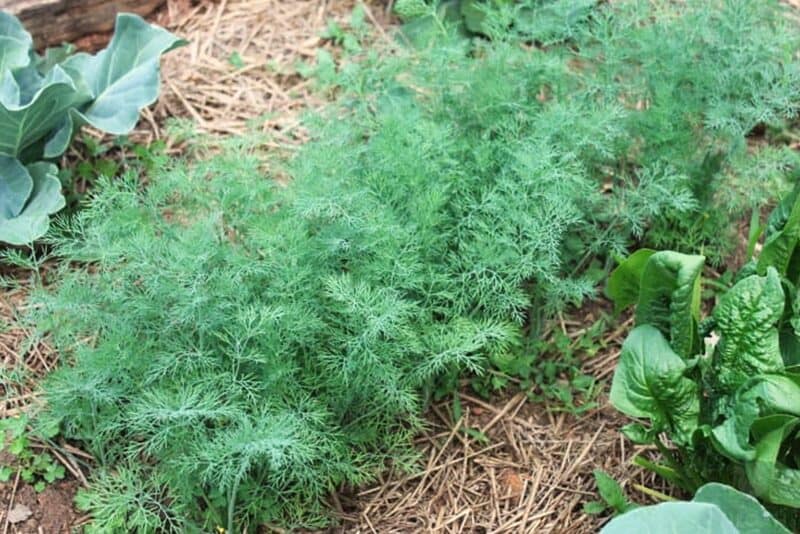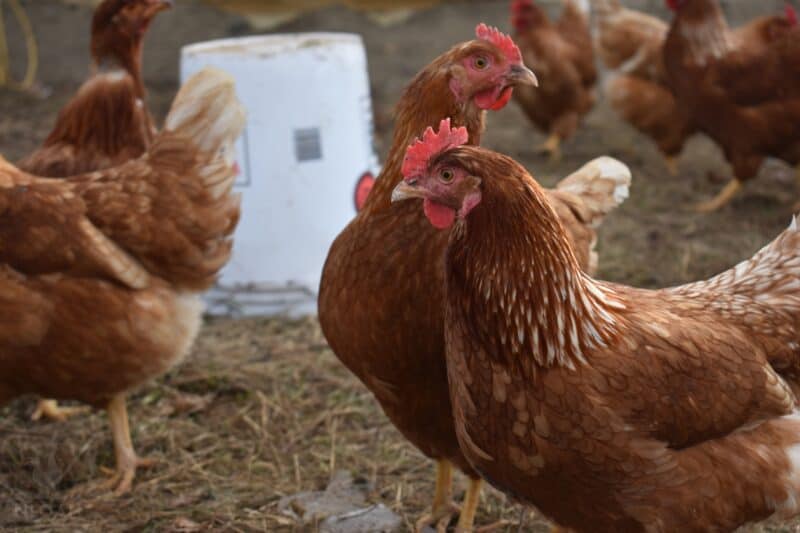One of the most interesting things about owning chickens is it seeing how enthusiastic they are about the foods they eat.

Chickens are pretty adventurous eaters, and being omnivores will eat plants, veggies, fruit, bugs, worms, meat, and everything in between.
On the vegetarian end of the spectrum some of their very favorite foods happen to be herbs.
That’s kind of funny considering the importance that herbs play in our own food! Have you ever thought about what kind of herbs chickens can eat? How about dill? Can chickens eat dill?
Yes, chickens can eat dill safely, but in moderation as a supplement to their diet, Dill is highly nutritious, packed with vitamins and minerals, and there is some evidence to suggest that it can improve the respiratory health of chickens.
In fact, chickens really seem to enjoy fresh dill, either on its own or mixed in with their usual food.
It will definitely give your flock a big boost of nutrition, too, so there’s no reason why you cannot incorporate it into their diet.
Keep reading, and learn everything you need to know about giving deal to your chickens.
Nutritional Profile of Dill
Dill is most commonly thought of for the characteristic flavor it gives pickles. But deal is much more than that, and it is also a surprisingly nutritious plant.
With a fair bit of protein, a few carbohydrates, and an extensive selection of vitamins and minerals, fresh dill is something of a superfood.
Considering the vitamin content of deal, we see that it contains lots of vitamin a, vitamin c, folate, and vitamin B2 – all important things your birds need, (though they do make their own vitamin C).
The rest of the vitamin profile is similarly impressive, with lots of vitamin B1, B3, and B5 to be had. This is an excellent vitamin profile by the standards of any veggie!
| Dill (Fresh) | Amount |
|---|---|
| Water | 86g |
| Energy | 43 kcal |
| Protein | 3.46g |
| Total lipid (fat) | 1.12g |
| Ash | 2.45g |
| Carbohydrate, by difference | 7.02g |
| Fiber, total dietary | 2.1g |
| Calcium, Ca | 208mg |
| Iron, Fe | 6.59mg |
| Magnesium, Mg | 55mg |
| Phosphorus, P | 66mg |
| Potassium, K | 738mg |
| Sodium, Na | 61mg |
| Zinc, Zn | 0.91mg |
| Copper, Cu | 0.146mg |
| Manganese, Mn | 1.26mg |
| Vitamin C, total ascorbic acid | 85mg |
| Thiamin | 0.058mg |
| Riboflavin | 0.296mg |
| Niacin | 1.57mg |
| Pantothenic acid | 0.397mg |
| Vitamin B-6 | 0.185mg |
| Folate, total | 150µg |
| Vitamin A, RAE | 386µg |
| Vitamin A, IU | 7720 IU |
And there’s even more to love when you look at the minerals…
Dill has tons of manganese and iron, lots of calcium, and a good amount of magnesium, potassium, and zinc.
Phosphorus is present in a slightly lesser amount, and it also contains a little bit of sodium, though it isn’t quite a bit by chicken standards so you don’t want to overdo it. Lastly, dill also contains trace amounts of copper.
This is a very impressive nutritional profile!
Benefits of Dill for Chickens
The vitamins in dill offer a wide range of health benefits to chickens.
Vitamin A, for instance, helps keep their eyes and skin healthy, while also aiding in the growth and development of their feathers.
Folate helps in the formation of red blood cells, which is essential for a healthy immune system.
The B vitamins play various roles, including helping chickens metabolize energy from their food more efficiently.
The minerals in dill also have various uses in the body, from maintaining bone strength to ensuring proper nerve function.
Plus, the trace amounts of copper found in dill can help keep a chicken’s red blood cells healthy and functioning properly.
Aside from the obvious benefits that the vitamins, minerals, and other micronutrients can do for chickens there is some evidence to suggest that dill can improve both respiratory health and chickens and also act as a mild sedative to help them stay calm.
Additionally, dill has shown proven properties at controlling certain insects, namely mites.
Though its efficacy has yet to be established in conjunction with animals, including chickens, it is promising and certainly won’t hurt in your ongoing battle to keep parasites at bay.

Can Chickens Eat Fresh Dill?
Yes, and this is the best way to serve it to them since fresh dill contains the most nutritional value.
Can Chickens Eat Dried Dill?
Yes, they can. However, drying dill does deplete some of its nutritional value, and nutrients are lost in direct proportion to how dried the dill gets, so it’s always best to give your chickens fresh dill if you can.
Can Chickens Eat Dill Seeds?
Yes, chickens can eat dill seeds. As part of a fresh dill plant, chickens will eat them right up, but you can also give them whole dill seeds to snack on.
Can Chickens Eat Dill Flowers?
Yes. If you have wild dill growing on your property, your chickens may nibble on the flowers. Don’t worry; they’re totally safe for their consumption.
Can Chickens Eat Cooked Dill?
Yes, they sure can. However, like drying, cooking processes do deplete some of the nutritional value, so it is best to only give your flock cooked dill incidentally rather than as a deliberate preparation if you want them to get maximum benefits.
Don’t Feed Pickles or Dill to Your Chickens that Have Been Cooked with Harmful Ingredients
If I say the word “dill” to you, what’s the very next word that comes to your mind? Don’t lie: it’s “pickle” right? Right. So, can chickens have pickles? No, they can’t.
Pickles are just too salty and acidic for the delicate digestive systems of chickens, and can seriously upset their stomachs if given to them.
Additionally, you should never give dill to your chickens that has been prepared with any other harmful ingredients like onions, salt, sugar, butter, and so forth.
These are all toxic to chickens, and some of the conditions they cause could be life-threatening.
Illnesses like salt poisoning (a real condition!), fatty liver syndrome, hypertension, sour crop, heart attack, and more can all spell doom for your poor bird, and all are a very bad way to die.
Keep the pickles for yourself, and just let your chickens snack on whole, fresh, healthy dill instead.
Beware of Pesticide on Store-bought Dill Plants
Another issue with dill, though not one inherent to the plant itself, is the possible presence of pesticides.
This is only a concern if you are buying store-purchased fresh dill or live plants, or if you have sourced dill from an unknown area. Dill is a pretty delicate plant, one vulnerable to many insect pests.
So, naturally, it’s usually treated with some form of pesticide to keep it whole prior to reaching market.
If you are buying fresh dill from the store or a nursery for your chickens try to only get organic, pesticide-free varieties and be sure to wash it thoroughly before giving it to your chickens in any case.
Pesticides are bad news for the sensitive biology of birds, and even trace residues can build up in their bodies over time if they eat them continually, so the very best thing you can do is grow the dill yourself.
How Often Can Chickens Have Dill?
As a supplement, once or twice a week. Dill is good for chickens, no doubt about that, but it is not a staple food, and so should only ever be offered in moderation as part of a balanced diet. Too much dill at once can possibly cause discomfort.
Preparing Dill for Your Flock
You won’t have much to do if you want to feed dill to your flock. You can hang up sprigs and let them peck away them, or rip the leaves off of the stems and then mix them in with their other food.
If you’re mixing the dill in with their dry food, consider adding just enough oil to make a fine film that will help the dill stick to the pellets. This will ensure the chickens actually eat it.
Can Baby Chicks Have Dill, Too?
Yes. Chicks can also eat dill, and it has the same benefits for them as adults.
However, you should probably wait until they are at least 6 weeks old before offering it to them, as their digestive systems are still developing at a young age.
Baby chicks will subsist just fine entirely on their recommended diet of starter feed, so don’t worry.
Once they’re a little older you can start offering them more interesting food as treats from time to time.
Tom has lived and worked on farms and homesteads from the Carolinas to Kentucky and beyond. He is passionate about helping people prepare for tough times by embracing lifestyles of self-sufficiency.
